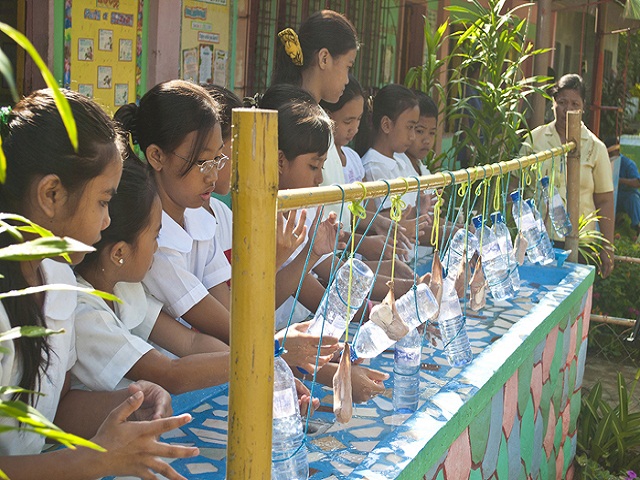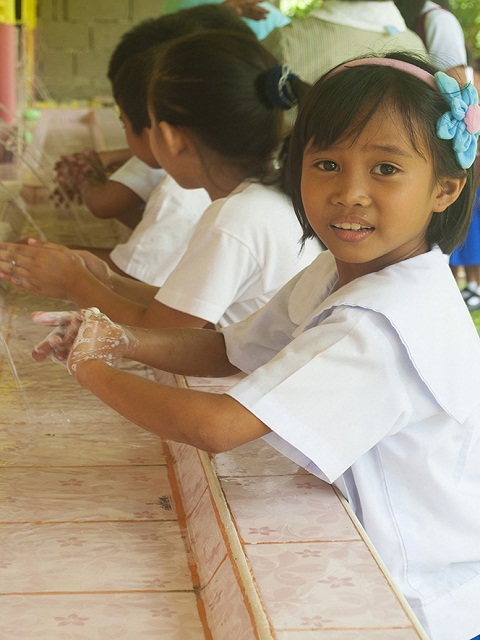NEW YORK/MANILA – As the world observes the 6th annual Global Handwashing Day (GHD) today, new figures from UNICEF say 1,400 children under five years of age still die every day from diarrhoeal diseases globally caused by a lack of safe water, sanitation and basic hygiene.

Students at Dolores Elementary School in Guimaras wash their hands in a tippy-tap hand-washing station. This system is a way to ensure that schools can hold group hand-washing without piped-in running water.
“The simple act of handwashing with soap is one of the most effective ways to save children’s lives,” says Sanjay Wijesekera, global head of UNICEF’s Water, Sanitation and Hygiene (WASH) programmes. “Washing hands before eating and after defecation drastically reduces the spread of diarrhoeal disease and has far reaching effects on the health and welfare of children and communities.”
According to UNICEF, diarrhoea remains the second largest cause of under-five mortality globally. With 600,000 children dying in each year and over 1.7 billion cases, diarrhoeal diseases are also associated with a higher risk of stunting (low weight for age and developmental delay) and take a huge toll on society. However, they can be easily prevented by one of the simplest and most inexpensive barriers to infection, i.e. handwashing with soap.
“The Philippines has made substantial strides towards overall socioeconomic development in the last few decades. At the same time, access to improved sanitation remains as a great challenge. About 26 per cent of Filipino populations do not have access to toilets, translating to more than 24 million people,” UNICEF Philippines Representative Tomoo Hozumi says. “Almost 8 million Filipinos are openly defecating. This figure is the third highest total in the Asia-Pacific Region,” Hozumi adds.

Global Handwashing Day (GHD) events around the world are helping promote handwashing and raise awareness of the crucially important role it plays in child survival and overall community health.
In the Philippines, GHD is marked yearly by a national celebration led by the Department of Education, Department of Social Welfare and Development, and Department of Health, and similar programs in public schools across the country. Traditionally held in elementary schools, the national celebration this year will be marked by separate but contiguous programs tomorrow, 16 October, in Barangay Socorro Day Care Center and Aguinaldo Elementary School in Quezon City. The two-part celebration seeks to highlight the need to promote positive hygiene practice in both day care and school settings.
“In schools and day care centers, UNICEF works very closely with Government, LGUs, NGOs and donors to promote safe water, sanitary toilets, hand-washing with soap and deworming to children,” says Tim Grieve, Chief of UNICEF Philippines’ WASH Section. “We have seen great results, with research showing a 30 per cent improvement in both child nutrition and children attending class.”
On 7 October 2013, DSWD Secretary Corazon Juliano Soliman issued a Memorandum encouraging DSWD Regional Directors to promote daily group handwashing with soap in all day care centers, ensure the availability of soap, safe water supply, functional toilets and handwashing facilities, and integrate hygiene promotion in the training of day care workers.
This year’s theme, announced by the Global Public Private Partnership for Handwashing, is "The Power Is In Your Hands," emphasizing the fact that everyone has the power to create healthier communities through handwashing with soap.
“The evidence is clear. Each individual—every mother, every child, every teacher, every member of every community—can contribute to the health of all by just washing their hands,” says Wijesekera. “If you knew of something monumental that could benefit the world, you would do it. Everyone has this power—simply wet, lather and rinse—with soap and water.”
Press release and photos from UNICEF Philippine
According to UNICEF, diarrhoea remains the second largest cause of under-five mortality globally. With 600,000 children dying in each year and over 1.7 billion cases, diarrhoeal diseases are also associated with a higher risk of stunting (low weight for age and developmental delay) and take a huge toll on society. However, they can be easily prevented by one of the simplest and most inexpensive barriers to infection, i.e. handwashing with soap.
“The Philippines has made substantial strides towards overall socioeconomic development in the last few decades. At the same time, access to improved sanitation remains as a great challenge. About 26 per cent of Filipino populations do not have access to toilets, translating to more than 24 million people,” UNICEF Philippines Representative Tomoo Hozumi says. “Almost 8 million Filipinos are openly defecating. This figure is the third highest total in the Asia-Pacific Region,” Hozumi adds.

Students at Piña Elementary School in Guimaras wash their hands during a class toothbrushing and handwashing session. UNICEF supports the Department of Education's Essential Health Care Programme, which has resulted in significant improvements in children's health and academic performance.
In the Philippines, GHD is marked yearly by a national celebration led by the Department of Education, Department of Social Welfare and Development, and Department of Health, and similar programs in public schools across the country. Traditionally held in elementary schools, the national celebration this year will be marked by separate but contiguous programs tomorrow, 16 October, in Barangay Socorro Day Care Center and Aguinaldo Elementary School in Quezon City. The two-part celebration seeks to highlight the need to promote positive hygiene practice in both day care and school settings.
“In schools and day care centers, UNICEF works very closely with Government, LGUs, NGOs and donors to promote safe water, sanitary toilets, hand-washing with soap and deworming to children,” says Tim Grieve, Chief of UNICEF Philippines’ WASH Section. “We have seen great results, with research showing a 30 per cent improvement in both child nutrition and children attending class.”
On 7 October 2013, DSWD Secretary Corazon Juliano Soliman issued a Memorandum encouraging DSWD Regional Directors to promote daily group handwashing with soap in all day care centers, ensure the availability of soap, safe water supply, functional toilets and handwashing facilities, and integrate hygiene promotion in the training of day care workers.
This year’s theme, announced by the Global Public Private Partnership for Handwashing, is "The Power Is In Your Hands," emphasizing the fact that everyone has the power to create healthier communities through handwashing with soap.
“The evidence is clear. Each individual—every mother, every child, every teacher, every member of every community—can contribute to the health of all by just washing their hands,” says Wijesekera. “If you knew of something monumental that could benefit the world, you would do it. Everyone has this power—simply wet, lather and rinse—with soap and water.”
Press release and photos from UNICEF Philippine

No comments:
Post a Comment